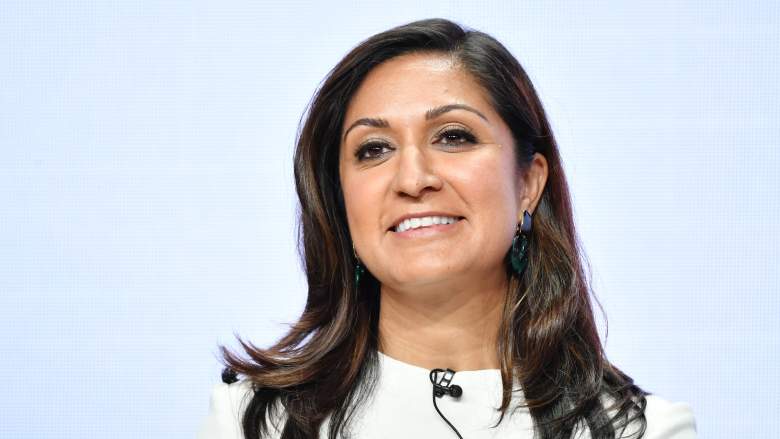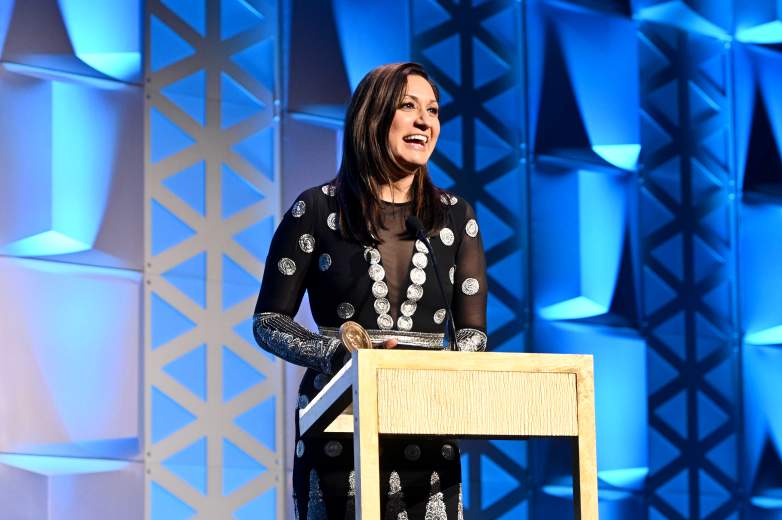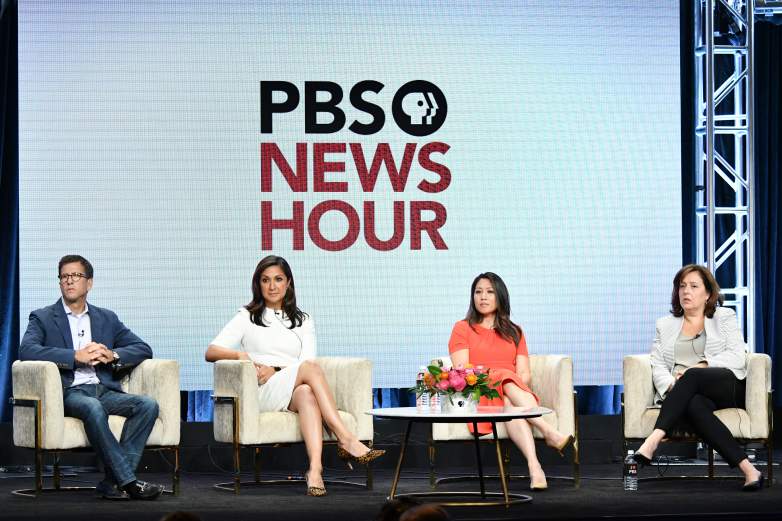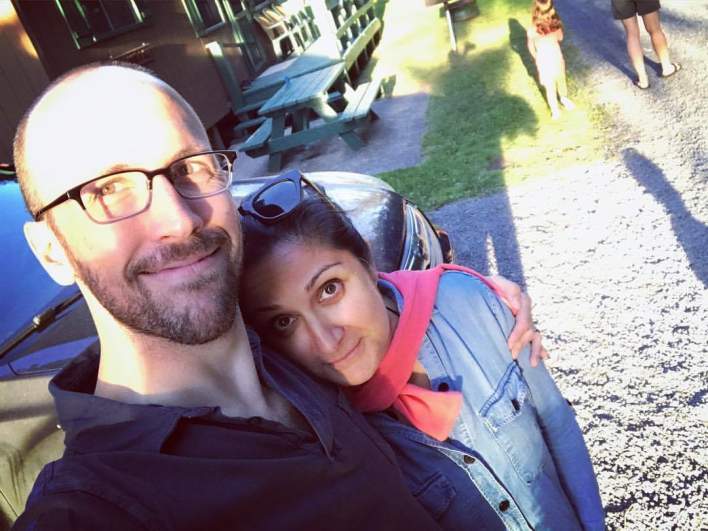
Amna Nawaz is an anchor and correspondent for PBS NewsHour who is one of four moderators of the December 2019 Democratic presidential primary debate being hosted by PBS and Politico at Loyola Marymount University in Los Angeles. She will be joined by NewsHour colleagues Judy Woodruff and Yamiche Alcindor and Politico’s Tim Alberta during the December 19 debate.
The 40-year-old Nawaz is a Virginia native who has worked in TV news media for several decades, as a correspondent, producer and editor. Nawaz has won several awards, including an Emmy Award for her NBC News report, “Inside the Obama White House.” She also won a Peabody Award at PBS for her part in NewsHour’s series on the global plastic problem.
PBS says about Nawaz, “At the NewsHour, Nawaz has reported politics, foreign affairs, education, climate change, culture and sports. Her immigration reporting has taken her to multiple border communities in Texas, New Mexico, Arizona, and Mexico. She’s investigated the impact of the Trump Administration’s immigration policies, including following the journey of a single toddler as she left her home in Mexico, was separated from her family at the U.S. border, and later reunited with her family several weeks later. She also regularly covers issues around detention, refugees and asylum, and migrant children in U.S. government custody.”
Here’s what you need to know about Amna Nawaz:
1. Amna Nawaz Was Born in Virginia as the Daughter of Pakistani Immigrant Parents & Followed Her Father’s Footsteps Into Journalism

GettyAmna Nawaz speaks onstage at the 78th Annual Peabody Awards Ceremony Sponsored By Mercedes-Benz at Cipriani Wall Street on May 18, 2019 in New York City.
Amna Nawaz was born and raised in Virginia with her sisters. Her parents were from Pakistan and immigrated to the United States. She graduated from Thomas Jefferson High School for Science and Technology in Fairfax County.
Nawaz’s father, Shuja Nawaz, is a journalist and political analyst. He and her mother, Seema Nawaz, still live in Arlington, Virginia. Shuja Nawaz is a distinguished fellow at the South Asia Center at the Atlantic Council and is an author, including of the August 19 book, “The Battle for Pakistan: The Bitter US Friendship and a Tough Neighbourhood.”
According to his website, Amna’s father, “writes for leading newspapers and The Huffington Post, and speaks on current topics before civic groups, at think tanks, and on radio and television. He has worked on projects with RAND, the United States Institute of Peace, The Center for Strategic and International Studies, the Atlantic Council, and other leading think tanks on projects dealing with Pakistan and the Middle East. In January 2009 he was made the first Director of the South Asia Center at The Atlantic Council of the United States.”
The elder Nawaz was a newscaster and news and affairs producer for Pakistan Television in the late 1960s and early 1970s and covered the western front of the 1971 war between Pakistan and India. He has also worked for The New York Times and the World Health Organization.
Amna Nawaz told Jade Magazine, “My father was a journalist in Pakistan. He covered wars, traveled far and wide, and anchored the national English-language news program. Still, he never pushed me towards it. He and my mother were always firm about each of us finding our own path.”
She added, “It’s funny how, over time, your childhood gets reduced to a series of moments you hold on to. I was lucky. Every memory I’ve now got is a good one. Climbing trees with my sisters in the front yard or careening down the street, all piled into a wagon. Sliding my feet into my mother’s high heels as I watched her get ready for dinner parties. Sitting on the couch with my father’s arm around me as we watched the evening news. My sisters and I all trying to talk over each other over a raucous dinner table each night.”
Nawaz told the magazine during the 2015 interview, “We traveled a lot – for months at a time over the summers. We spent a lot of time together. And we grew up with a sense of community – with most of our relatives far away, many of the other first-generation Pakistani-American kids were like family – their mothers and fathers, our Aunties and Uncles. My parents were loving and supportive and consistent, and they showed up – to every play, every away game, every piano recital. They raised us to know how lucky we were, and how important it was to leave things a little better than you found them.”
Nawaz is the first Pakistani-American and first Muslim-American to moderate a presidential primary debate.
2. Nawaz Studied at the University of Pennsylvania & the London School of Economics & Considered Becoming a Lawyer Before a Fellowship at ABC News
Nawaz graduated from the University of Pennsylvania in 2001 with degrees in politics, philosophy and economics, according to her Linkedin profile. While at Penn, she spent a year studying abroad at the University of Zimbabwe, “researching (her) undergraduate thesis on the viability of democracy in fledgling states.” Nawaz also studied at the London School of Economics, earning her master’s degree in comparitive politics. She wrote her thesis on the middle east peace process.
Nawaz told Jade Magazine she thought about becoming an attorney, but then found her way to journalism.
“I loved to write. I thought I might one day be a lawyer (I also loved to argue.) I got a one-year fellowship at ABC News right out of college. I figured I’d apply for law school afterwards. But a few weeks into the job – my first – the 9/11 attacks happened,” Nawaz told the magazine. “A lot of things I’d believed to be true – about my faith, about the part of the world I come from, about who I was – were called into question. I found solace, a sense of purpose, in trying to find out the answers. And I saw how important it was to provide that information to others. It’s one of the only jobs I know of where you can actually learn something new every day. I still get such a kick out of that.”
She told Mochi magazine in 2015, “It was a young adult defining moment for me. Journalism was the key to finding answers. It gave me solace. The more I did it, the more satisfaction I found in it, and the more I loved it.”
Nawaz told the South Asian Journalists Association in 2014, “From day one in this industry, I was immersed in a system that held itself to the highest standards, with the chance to learn from some of the most talented, kindest, most dedicated people in the business.” She says she has always, “looked to brilliant female journalists, such as Andrea Mitchell, Christiane Amanpour and Martha Raddatz for inspiration.”
3. Nawaz Worked at NBC News & ABC News as a Producer, Foreign Correspondent & Editor Before Joining PBS NewsHour in 2018

Richard Coolidge, Amna Nawaz, Stephanie Sy and Sara Just of PBS Newshour speak during the PBS segment of the Summer 2019 Television Critics Association Press Tour 2019 at The Beverly Hilton Hotel on July 29, 2019 in Beverly Hills, California.
After spending a year as a Nightline Fellow at ABC News, Amna Nawaz moved on to a job at NBC News as a news associate. She then became an associate producer and in 2006 was promoted to producer, working on the network’s investigative unit, domestic news coverage team and foreign breaking news team.
In 2011, Nawaz became the bureau chief and correspondent for NBC News in Islamabad, Pakistan, returning to her family’s roots. On Linkedin, she said she, “Oversaw and managed NBC News’ team and operations in Pakistan and the greater region. Reported live and tape stories from Pakistan, Afghanistan, Indian, Turkey, Syria for all NBC News and MSNBC platforms – on-air and online – including exclusive access as the first foreign journalist inside North Waziristan, and leading coverage of drone strikes in the area.”
She told Mochi about working in Pakistan, “I spent a lot of time there as a kid. Going back there as an adult and professional was a completely different experience. I got to see it with fresh eyes. … Growing up, no one on TV looked like me. If I’m to represent someone’s experiences out there, with someone thinking, ‘That’s something I can relate to,’ that’s great.”
She said working as a foreign correspondent was dangerous, telling Mochi, ““I never kid myself about the risks, and I don’t think anyone going into conflict zones, where kidnappings and random violence are common, should ever think for a second that they’re immune. You have to be willing to acknowledge and accept that a lot of it comes down to sheer luck.”
Nawaz told Jade Magazine, “I’ve had people make assumptions about me – because I’m a woman, because I’m Asian, because my family’s from Pakistan, because I’m Muslim – but I can’t control what others think. All I can do is bring my whole self to this job, to report the stories as I see them, and try to treat others’ stories with the same care and respect I’d want someone to treat mine.”
In 2014, Nawaz returned to the United States and worked as a managing editor for NBCNews.com. In 2015 she moved to ABC News, working as an anchor and reporter from 2015 to 2018. She then made the move to PBS NewsHour in April 2018.
4. Nawaz Says While She Is Troubled by the Attacks on the Press, ‘I Don’t Think There’s Ever Been a Better Time to Be a Journalist in Modern American History’
During a Reddit “Ask Me Anything” question and answer session in October 2018, Nawaz was asked about the state of journalism and press freedom in the United States. She responded, “I feel pretty good. I don’t think there’s ever been a better time to be a journalist in modern American history. yes, there are challenges. yes, there are hurdles. But I think those challenges and hurdles force us to be better. On the issue of press freedom, I’ve reported from countries where there’s really no press freedom. So that’s my basis for comparison. I’m troubled by attacks on the press here — from the president to the people I meet while out reporting stories — but that doesn’t change what we do, or how we do our jobs. The only way to get people to trust us is by continuing to do what we do every day.”
She said about her move from commercial news to PBS, “Not my responsibilities in terms of how I tell stories, but certainly the TIME I get to tell those stories. In previous roles, I’ve had to fit really complicated topics into a couple of minutes (and the journos who are good at this are also reeeeallly good at culling down to just the most essential info). But having 6, 7, even 10 minutes to thoughtfully explore a topic is a luxury. It allows for context and nuance. Two things that we could really use more of right now.”
Asked why NewsHour is worth prioritizing over other news, she replied, “Here’s my pitch for what we offer: it’s straightforward, thoughtful reporting that’s unparalleled in the American media landscape. I’m so proud of what we put out every day – on the broadcast and online. But I’m never going to say you should ONLY have one news source. These days, I think it’s more important than ever to have multiple sources. Just watch/read ours first and go from there.”
5. Nawaz Is Married to a Fellow Journalist & They Have 2 Daughters Together

Amna Nawaz and her husband, Paul Werdel.
Amna Nawaz’s husband is Paul Werdel, a fellow journalist who was formerly a product director at The New York Times. They have been married since 2007 and have two young daughters together.
Werdel, 39, says on Linkedin he is a “Former News & Product Guy, Figuring Out What’s Next.”
Werdel worked for The New York Times from 2012 to April 2018, when he and his wife re-located to Washington D.C. for her job at PBS. He was an assistant editor for digital platforms, senior editor of platforms, senior product manager for mobile and product director for The Times’ home page. Before joining The Times, Werdel worekd as an editor or producer at Talking Points Memo, Al Jazeera English and BBC World News. He also taught at the University of Maryland. He graduated from UMD in 2002 with a journalism degree.
READ NEXT: Runner Who Slapped Reporter’s Backside on Live TV Is Arrested